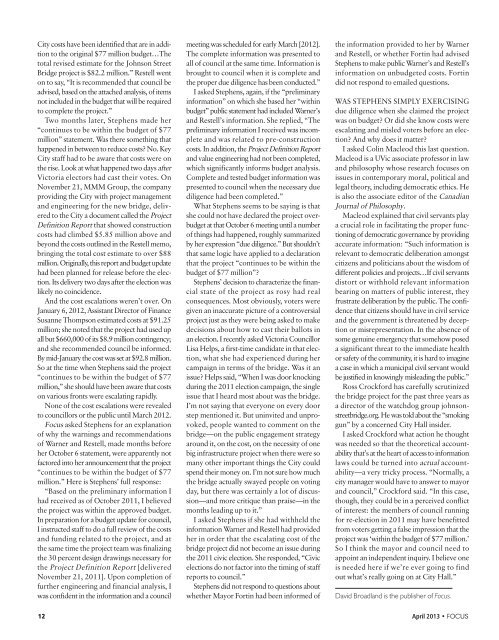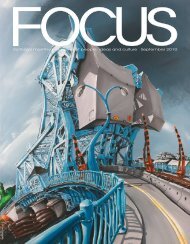Create successful ePaper yourself
Turn your PDF publications into a flip-book with our unique Google optimized e-Paper software.
City costs have been identified that are in additionto the original $77 million budget…Thetotal revised estimate for the Johnson StreetBridge project is $82.2 million.” Restell wenton to say, “It is recommended that council beadvised, based on the attached analysis, of itemsnot included in the budget that will be requiredto complete the project.”Two months later, Stephens made her“continues to be within the budget of $77million” statement. Was there something thathappened in between to reduce costs? No. KeyCity staff had to be aware that costs were onthe rise. Look at what happened two days afterVictoria electors had cast their votes. OnNovember 21, MMM Group, the companyproviding the City with project managementand engineering for the new bridge, deliveredto the City a document called the ProjectDefinition Report that showed constructioncosts had climbed $5.85 million above andbeyond the costs outlined in the Restell memo,bringing the total cost estimate to over $88million. Originally, this report and budget updatehad been planned for release before the election.Its delivery two days after the election waslikely no coincidence.And the cost escalations weren’t over. OnJanuary 6, 2012, Assistant Director of FinanceSusanne Thompson estimated costs at $91.25million; she noted that the project had used upall but $660,000 of its $8.9 million contingency;and she recommended council be informed.By mid-January the cost was set at $92.8 million.So at the time when Stephens said the project“continues to be within the budget of $77million,” she should have been aware that costson various fronts were escalating rapidly.None of the cost escalations were revealedto councillors or the public until March 2012.<strong>Focus</strong> asked Stephens for an explanationof why the warnings and recommendationsof Warner and Restell, made months beforeher October 6 statement, were apparently notfactored into her announcement that the project“continues to be within the budget of $77million.” Here is Stephens’ full response:“Based on the preliminary information Ihad received as of October 2011, I believedthe project was within the approved budget.In preparation for a budget update for council,I instructed staff to do a full review of the costsand funding related to the project, and atthe same time the project team was finalizingthe 30 percent design drawings necessary forthe Project Definition Report [deliveredNovember 21, 2011]. Upon completion offurther engineering and financial analysis, Iwas confident in the information and a councilmeeting was scheduled for early March [2012].The complete information was presented toall of council at the same time. Information isbrought to council when it is complete andthe proper due diligence has been conducted.”I asked Stephens, again, if the “preliminaryinformation” on which she based her “withinbudget” public statement had included Warner’sand Restell’s information. She replied, “Thepreliminary information I received was incompleteand was related to pre-constructioncosts. In addition, the Project Definition Reportand value engineering had not been completed,which significantly informs budget analysis.Complete and tested budget information waspresented to council when the necessary duediligence had been completed.”What Stephens seems to be saying is thatshe could not have declared the project overbudgetat that October 6 meeting until a numberof things had happened, roughly summarizedby her expression “due diligence.” But shouldn’tthat same logic have applied to a declarationthat the project “continues to be within thebudget of $77 million”?Stephens’ decision to characterize the financialstate of the project as rosy had realconsequences. Most obviously, voters weregiven an inaccurate picture of a controversialproject just as they were being asked to makedecisions about how to cast their ballots inan election. I recently asked Victoria CouncillorLisa Helps, a first-time candidate in that election,what she had experienced during hercampaign in terms of the bridge. Was it anissue? Helps said, “When I was door knockingduring the 2011 election campaign, the singleissue that I heard most about was the bridge.I’m not saying that everyone on every doorstep mentioned it. But uninvited and unprovoked,people wanted to comment on thebridge—on the public engagement strategyaround it, on the cost, on the necessity of onebig infrastructure project when there were somany other important things the City couldspend their money on. I’m not sure how muchthe bridge actually swayed people on votingday, but there was certainly a lot of discussion—andmore critique than praise—in themonths leading up to it.”I asked Stephens if she had withheld theinformation Warner and Restell had providedher in order that the escalating cost of thebridge project did not become an issue duringthe 2011 civic election. She responded, “Civicelections do not factor into the timing of staffreports to council.”Stephens did not respond to questions aboutwhether Mayor Fortin had been informed ofthe information provided to her by Warnerand Restell, or whether Fortin had advisedStephens to make public Warner’s and Restell’sinformation on unbudgeted costs. Fortindid not respond to emailed questions.WAS STEPHENS SIMPLY EXERCISINGdue diligence when she claimed the projectwas on budget? Or did she know costs wereescalating and misled voters before an election?And why does it matter?I asked Colin Macleod this last question.Macleod is a UVic associate professor in lawand philosophy whose research focuses onissues in contemporary moral, political andlegal theory, including democratic ethics. Heis also the associate editor of the CanadianJournal of Philosophy.Macleod explained that civil servants playa crucial role in facilitating the proper functioningof democratic governance by providingaccurate information: “Such information isrelevant to democratic deliberation amongstcitizens and politicians about the wisdom ofdifferent policies and projects…If civil servantsdistort or withhold relevant informationbearing on matters of public interest, theyfrustrate deliberation by the public. The confidencethat citizens should have in civil serviceand the government is threatened by deceptionor misrepresentation. In the absence ofsome genuine emergency that somehow poseda significant threat to the immediate healthor safety of the community, it is hard to imaginea case in which a municipal civil servant wouldbe justified in knowingly misleading the public.”Ross Crockford has carefully scrutinizedthe bridge project for the past three years asa director of the watchdog group johnsonstreetbridge.org.He was told about the “smokinggun” by a concerned City Hall insider.I asked Crockford what action he thoughtwas needed so that the theoretical accountabilitythat’s at the heart of access to informationlaws could be turned into actual accountability—avery tricky process. “Normally, acity manager would have to answer to mayorand council,” Crockford said. “In this case,though, they could be in a perceived conflictof interest: the members of council runningfor re-election in 2011 may have benefittedfrom voters getting a false impression that theproject was ‘within the budget of $77 million.’So I think the mayor and council need toappoint an independent inquiry. I believe oneis needed here if we’re ever going to findout what’s really going on at City Hall.”David Broadland is the publisher of <strong>Focus</strong>.12 April 2013 • FOCUS
















